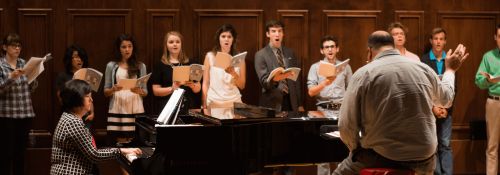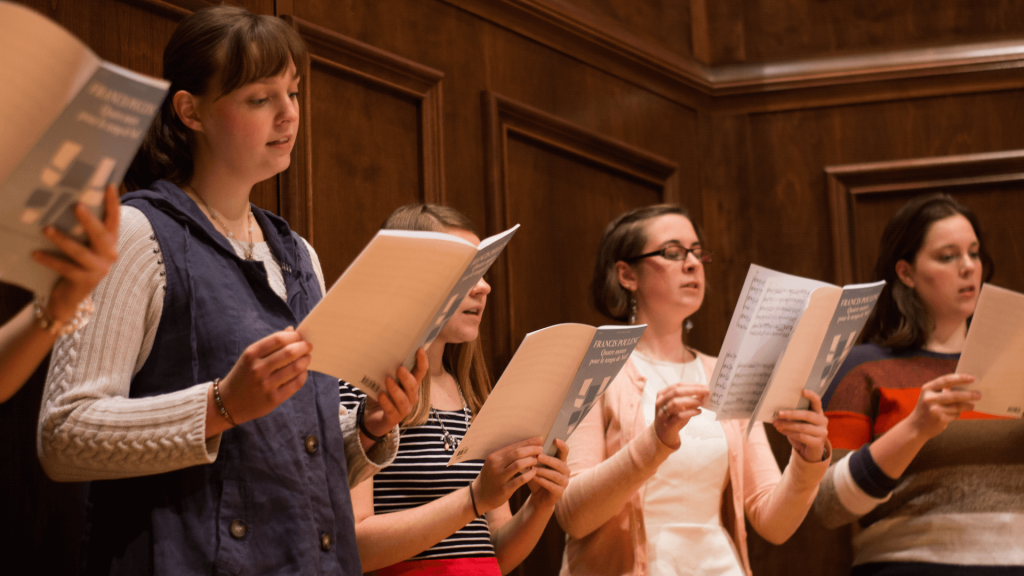
Music in Community: Spotlight on Chamber Choir
Written by Sarah Chavey
The last ringing note fades, and the audience sits in stillness. The purity of tone and beauty of text are suspended in the air for a fleeting twinkle of time before the crowd applauds the Hillsdale College chamber choir performance at the 2015 Fall Convocation.
The chamber choir is what Prof. Holleman calls an “ambassador for the college and the students,” distinguished not only by quality of sound, but also by tradition and beauty.
“The college is grounded in tradition,” Prof. Holleman says, “and in the chamber choir we’ve created a tradition. We’ve created a tradition of a capella singing, and we’ve created a tradition of quality and beauty.”
Prof. Holleman chooses each year’s program with precision, beginning the process at a Toledo music store and sorting through large bins of sheet music. From there, he takes a sizable stack to a trusted friend, and then he brings the slightly smaller pile back to accompanist and assistant conductor Debbi Wyse, who listens to each song. After the two discuss the pros and cons of each piece, they finally determine a program.
“I think that a lot of the chamber choir texts that we use develop our minds and improve our hearts,” Prof. Wyse says. “We’ve done a lot of sacred texts. Particularly this year with a focus on Christmas, some of those texts are pretty wonderful.” She mentioned in particular a song the choir frequently warms up with that reads, “God be in my heart / mine eyes / my mouth / mine heart / my end.”
Prof. Wyse said the students truly embrace the motto “strength rejoices in the challenge” as they delve into pieces by demanding composers such as Eric Whitacre.
“It takes a lot of focus to do this and a heightened level of musicianship, not just in counting, but in your attitude and in how you act,” sophomore Sarah Schutte says.
Sarah fell in love with chamber choir the first time she heard them at freshman convocation. After a nerve-racking audition, she waited anxiously for her “mini acceptance letter” that told her she’d made it in. “You have to remember it’s a privilege and an honor,” she said.
Alumnus David Krueger looks back fondly on chamber choir, partly because of the social aspect, but also because of the character building it includes.
“You have to be able to resist sulking if you don’t get a part you wanted, give up your time to help others if they want it, be sensitive, sincere, and respectful to others, volunteer to do hard work that you haven’t the remotest interest in doing, and make other sacrifices that you frankly just don’t want to make,” David said.
David also developed as a leader in choir, noting that leadership is “an essential component of self-governance.” Through some of the leadership exercises Prof. Holleman had them do, David learned the importance of understanding and accepting others.
“Don’t be afraid to make mistakes,” Prof. Holleman frequently echoes at rehearsals. Matt Sauer points to that as one of the most important lessons he’s learned from chamber choir.
“I’m a stronger singer because it’s a group that challenges me to be my best without being judged for being wrong. Knowing that you’re surrounded by people who are going to support you allows you to take risks and grow as a singer, and as a person as well. Confidence goes up, and the sound is more coherent,” Matt said.
Through this support system, chamber choir students are able to learn and grow as a whole, enhancing their quality and their experience.
“I’ve always said that choral ensembles are the best example of the whole being greater than the sum of the parts,” Prof. Holleman said. “It’s taking all these different voices from different experiences and creating one concept of the sound that we’re going after. I do that through vowel modification, through placement, through listening, through describing the sound I want in rehearsal.”
Before Prof. Holleman came to the college, the chamber choir would perform at events like St. Cecilia Day Concerts, with costumes, food, and a harpsichord. When he arrived in 1997, he revived the fading choir by bringing a seriousness to it and concentrating on improving the quality of sound.
“With voice, you’re not just dealing with pitch and rhythm. You’re dealing with vowel shapes, tones, and colors. The voice can create more colors than most single instruments. Most instruments have a standard tonal quality that everybody strives for. The human voice is more malleable and has more variety in it,” Prof. Holleman said.
After spending close to 20 years with the constantly evolving group, Prof. Holleman can’t imagine leaving them.
“Ever since day one, there’s been talk of ‘I do too much,’ and at some point I’m going to have to relinquish something. In any talk that I’ve had, I’ve said ‘you’re going to have to pry my hands off the chamber choir,’” Prof. Holleman said. “Artistically, I created it with Debbi. It’s so much a part of my life. I don’t want to not do that.”
Chamber choir performs at convocation and graduation, as well as several other college events, sometimes in different cities. It is part of a freshman’s first experience, and a senior’s last. In some ways, it helps sum up the experience of a Hillsdale student.
“The school is all about goodness and truth and beauty, and, in so many ways, that’s what chamber choir is all about. It’s about showing the school for all that it is. It’s displaying another side of the goodness, truth, and beauty that can be found in other ways, and showing the excellence of the school in music,” Sarah said.
Sarah Chavey is a music major from Ann Arbor, Michigan. She hopes to pursue journalism when she graduates in 2017.

